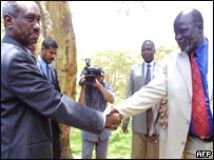Sudan’s peace negotiator calls for creation of independent state in Abyei
May 25, 2011 (JUBA) – The chief mediator of the Sudan’s Comprehensive Peace Agreement (CPA), General Lazarus Sumbeiywo, has proposed the need to create an independent state of Abyei as a solution to the current stalemate between North and South Sudan over ownership of the region in a press conference in Nairobi, Kenya on Tuesday.

Sumboyo criticised the two signatories of the CPA; the National Congress Party (NCP) in the north and the Sudan People’s Liberation Movement (SPLM) in the South, for what he said was a “lack of political will to resolve the Abyei issue.”
He reserved particular blame for the three-man presidency created by the peace deal for not meeting regularly even when the situation requires their forum to discuss the issue. The presidency comprises the President of the Republic of Sudan, Omar Hassan al-Bashir, his first deputy and president of the Government of Southern Sudan, Salva Kiir Mayardit and the vice president, Ali Osman Mohamed Taha.
He suggested that Abyei could have independence in a similar form to Lesotho, a small kingdom within South Africa.
However, the chairman of the Juba-based Abyei referendum body, Chol Deng, on Tuesday rejected the proposal, explaining that Abyei would not be a viable state given its small territory and population.
According to the result of the Sudan’s 2008 population census, the population of the Abyei region was only 52,883. That included the populations of the nine Ngok Dinka chiefdoms, the Messirya Arab nomadic tribe as well as other Sudanese residents in the area.
Deng, who is also a member of Dinka Ngok community in Abyei, said even if the whole population of Dinka Ngok were to return to Abyei region, the population would still be insufficient to constitute an independent state.
In 2004 Abyei was responsible for 25% of Sudan’s oil production. By 2009 that had declined to 9%. As well as this being the year when the Permanent Court of Arbitration (PCA) in The Hague ruled that the Heglig and Bamboo oil fields outside Abyei, the reserves are severely depleted. The fertility of the land and the significance of the Kiir/Barh el-Arab river to the region are both significant factors.
As of July 9, it is planned, in accordance with the CPA, that the Republic of South Sudan will be established. It will be land-locked so the export of its oil is a contentious issue. The majority is currently sent via pipeline, to the coast of north Sudan.
Higlig oilfields, which were previously contested between Unity and Abyei states, before the signing of the CPA, are currently contested between Unity and Southern Kordufan, which is in north Sudan.
A leading member of the Messirya tribe, Babakhir Nimir, rebuked the proposal of an independent state of Abyei, saying it was not a solution to the current crisis. He also accused both the NCP and SPLM for politicizing the Abyei issue between Ngok Dinka and Messirya tribe, saying the “two tribes lived side by side and in harmony in Abyei for hundreds of years and will continue to live there for more hundreds of years.”
The UN Security Council team, which met the South Sudan leadership in Juba on Monday and Tuesday, called on the two parties to pursue a peaceful settlement to the Abyei crisis.
Meanwhile, South Sudan president, Salva Kiir, is scheduled to address the nation on Thursday in Juba about the crisis in Abyei and how the government is approaching its resolution. According to a statement by the minister of information, Barnaba Marial Benjamin, on Tuesday, the president will stress the importance of handling the situation through peaceful means.
The people of Abyei were supposed to hold a referendum in January 2011 and choose between being part of north or South Sudan. The referendum has been subject to severe delays.
(ST)
